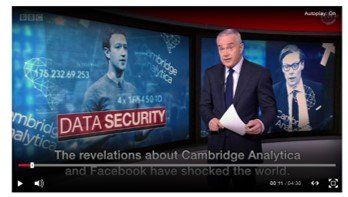

Videos
Videos & Podcasts
"A picture is worth a thousand words" Popular English saying
The videos selected for this page deal in one way or another with our main concerns about democracy in the Information Age, and in particular, developments in artificial intelligence and social media, and the problems associated with information overload, misinformation, malicious propaganda and information warfare. The material is grouped under the following headings:
On getting the balance right...
Please Note: Some website operators (like the BBC) don't allow you to show their videos directly, so you need to go to their website. We've provided a link. On a few of the links you will find irritating adverts, but they only last as few seconds... The choice of material is necessarily eclectic. We are still working on the selection and hope to gradually improve the balance of ideas / perspective on developments.[1] If you would like to suggest items to add — or videos / comment you think we should remove — please get in touch with your suggestions (and your reasoning). Thank you!
By copying the BBC News logo we are NOT suggesting that the BBC puts out 'fake news', rather that it is easy to hijack familiar symbols and corrupt them. Indeed, much 'fake news' contains some element of truth. So do be careful. Some messages are subliminal!
Page Content
Our Selection from Recent Videos & Podcasts
a) What is fake news and how can you identify it?
Fake news is not only news that you disagree with. It can also very closely mimic real news stories. This new video is part of a series by the BBC
on disinformation and fake news - "a global problem challenging the way we share information and perceive the world around us." Watch the video here
[12 Nov 2018; 1:54 mins].
b) The face-mapping technology raising fears about fake news
"This facial mapping technology has been designed to improve television language dubbing, but it also has strong potential for those seeking to deceive. BBC's Media Editor Amol Rajan looks at the benefits and risks - and tries it out himself." Watch the video here
[14 Nov 2018; 3:05 mins]. Here's another example from Auntie.
c) OpenAI Artificial-Intelligent Writer
Researchers at OpenAI
in San Francisco have built an artificially-intelligent writer that makes up coherent stories ('deepfakes for text'), but they say that they are withholding the technology as it might be used for "malicious" purposes. They are concerned that the tool could be used to mass-produce convincing 'fake news'. In this short video, The Guardian
prompts the software with various lines from famous writers. You can watch what happens. (15 Feb 2019; 1:23 mins) and read about it here.
d) Operation Infektion
The New York Times
has a new 1 hr long documentary
on disinformation, which was launched on 10 Nov 2018. Watch a clip here
[13 Nov 2018; 17:27 min]. "Operation Infektion begins in the Soviet Union in 1959, when one of the world’s greatest disinformation engines was born. By way of animation and riveting interviews with Soviet disinformation agents, the series reverse-engineers the KGB playbook that concocted viral lies in a pre-Internet era."
"The film pulls back the curtain on Moscow’s disinformation campaign, revealing it to be a highly organized, well-funded, concerted effort by Russian military intelligence operating since the 1960s — its purpose, then and now, to destabilize the West so Russia can more easily bully countries one by one. This playbook of deceit is now being mimicked worldwide, from India to Myanmar to Washington, D.C. Today’s fake news crisis is an old story, not a new story, and Operation Infektion will forever change how you consume news."
And the conclusion? The next few years are "going to be worse than the last few years." Today it's "'us versus them', and 'us versus us'".
e) Sam Harris interview with Renee DiResta [New Knowledge]
Great Sam Harris interview with one of America's leading 'fake news' fighters, Renee DiResta of New Knowledge. In this podcast Sam and Renee focus on Russian interference in US politics via social media, and in particular, the workings on the Intenet Research Agency
in St Petersburg. Some of the details are fascinating and deeply worrying.
f) Olga Yurkova's TED Talk
Sometimes a video really stands out. Here's an example: it's a TED classic given by Olga Yurkova, a journalist and cofounder of StopFake.org, an independent Ukrainian organization that amongst other things trains fact-checkers in an effort to curb propaganda and misinformation in the media .
When facts are false, decisions are wrong, says Olga. To stop the spread of fake news, she and a group of journalists got together in early 2014 to launch StopFake.org
to "expose biased or inaccurate reporting" and "rebuild the trust we've lost in our journalists, leaders and institutions."Watch Olga's video here
[Apr 2018; 5:16 mins] and read more about her here.
g) Deepfake? Here's a low tech version that's proving very controversial
Facebook
has refuses to delete fake Pelosi video spread by Trump supporters. It says it will continue to host a video of Nancy Pelosi that has been edited to give the impression that the Democratic House speaker is drunk or unwell, in the latest incident highlighting its struggle to deal with disinformation. Concerns have been raised in recent years about the impact of 'deep fake' videos, where artificial intelligence technology is used to create disturbingly realistic videos. However, the Pelosi video shows that a low-tech approach can be successful. (24 May 2019; 0:38 mins) Read about the video here.
h) The MacTaggart Lecture: Dorothy Byrne
In the 2019 MacTaggart Lecture
at the Edinburgh Festival
[21 Aug] Dorothy Byrne, Channel 4’s Head of News & Current Affairs, is outspoken about the behavior of seniour British politicians. She says Prime Minister Johnson is a "known liar" and calls on broadcasters to "aggressively challenge [his] falsehoods." Byrne says Johnson’s shift towards publishing his own videos on Facebook rather than giving sit-down interviews to journalists reminded her of the Russian president, “who also likes to talk directly to the nation”. [47:06 mins] Not to be missed!
Byrne is one of the longest-serving heads of commissioning in the television industry. She has won numerous international Emmy, BAFTA and RTS Awards. She was made a Fellow of The Royal Television Society
for her “outstanding contribution to television” and received the Outstanding Contribution Award
at the RTS Journalism Awards in 2018. She is a trustee of the Ethical Journalism Network
which supports the development of ethical codes in journalistic organisations across the globe. She is a Visiting Professor at De Montfort University where Channel 4 supports an MA in Investigative Journalism.
1 Getting Started [Some Basics]
1.1 Top 10 Social Networks and What to Post on Them
To get us started, here's a tongue-in-cheek (cynical?) overview of "10 of the biggest social networks and what you should really spend your time posting on them."
The video was posted by Wyatt Kane (on 5 Apr 2015). Kane says he makes "funny ASMR videos to relax you and other comedy videos to make you laugh." ASMR (Autonomous Sensory Meridian Response) videos claim to "induce a tingling feeling in the viewer". They become an internet phenomenon a few years ago (~2014; 5:39 mins).
The video was posted by Wyatt Kane (on 5 Apr 2015). Kane says he makes "funny ASMR videos to relax you and other comedy videos to make you laugh." ASMR (Autonomous Sensory Meridian Response) videos claim to "induce a tingling feeling in the viewer". They become an internet phenomenon a few years ago (~2014; 5:39 mins).
1.2 Social Media Marketing in 3 minutes
This video is a little dated but it provides a useful overview of why people use social media (to promote their business) and how to make the most of it. It was produced by Upside Down Iceberg
— 'our niche is helping you expose yours'. It was published 4 Jun 2015. (3:33 mins)
If you can suggest an alternative, perhaps one which also explains how private individuals use social media, please do!
If you can suggest an alternative, perhaps one which also explains how private individuals use social media, please do!
1.3 How Facebooks' Newsfeed Works
This video
provides a simple explanation of how Facebook's News Feed ranking system works and how (Facebook
claims) "it helps you see the things on Facebook
that matter to you most."
[~2018; 2:51 mins]
1.4 Kids baffled by YouTube and Instagram terms
The terms and conditions of sites like YouTube
and Facebook
require a reading age of at least 18 to be properly understood, the BBC
has found. (The minimum age to use apps is 13.) "Firms could be breaching European data rules, which require them to clearly spell out how they use personal data. But many tech sites say they are working on improving the legibility of their legal documents by introducing easy-to-read summaries." View video
[6 July 2018; 1:34 mins] and read the full story/learn about how tech companies use your data, here.
1.5 What is the dark web?
There are two webs: there’s the normal web most people use every day, which is easily accessible and indexed by search engines; and then there’s the 'dark web' – hidden websites that won’t show up when you search Google, and can’t be accessed without special software. Watch video here. [BBC; 2018; 1:18 mins] This CNBC
video
[16 Apr 2018; 3:51 mins] is also good. Read further about the darkweb here. TOP
2 Fake News & How to Spot it
2.1 A brief history of fake news
2.2 How 'fake news' entered the mainstream
What began as a way to describe misinformation was quickly diverted into a propaganda tool. The BBC's Dave Lee examines how "fake news" went mainstream.
Watch it here[12 Nov 2018; 2:38 mins]
2.3 How fake news spreads when facts are not checked
This short video from Sweden shows how a misleading headline can cause a lot of grief if the facts are not checked. It is produced by media company Viralgranskaren.
Watch it here. [18 Nov 2016; 1:32 mins]
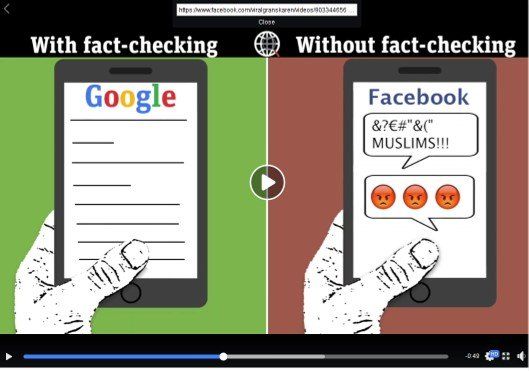
2.4 Fake News: What is it? And how to spot it
"Many of us like to share news and stories on social media with our friends. We all share things for different reasons.
Perhaps it's an interesting story, news about a celebrity that you like, or something that made you laugh. But when you see something you like online, do you check to make sure that it's true before you share it?"

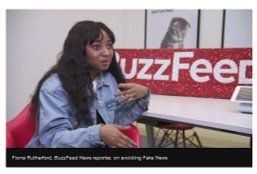
These videos
are designed primarily for children and young people. [17 Feb 2017; 1:30 & 1:48 mins]
2.5 Ways to Spot Fake News
"These days it can be hard to tell what news is legit, what's opinion, and what's full-on fake. These five tips can help you weed out the real from the completely made up. "
Watch video. [undated; 01:09 mins]
Watch video. [undated; 01:09 mins]

2.6 This NATURAL TRICK can CURE YOUR CANCER
This Facebook
video promises easy answers but delivers hard lesson about critical thinking. It tells the fake story of Dr Johan Tarjany, who in 1816 discovered a kind of moss that cures cancer, knowledge the video claims has been suppressed by pharmaceutical companies. And the story gets better: Tarjany added the moss to his diet and never got cancer even though the Food and Drug Administration
banned the moss. The video went viral. [3 Jul 2018; 2:02 mins] You can read about why the video was produced and what happened here.
2.7 Fake five-star reviews being bought and sold online
Some Amazon
reviews contain a disclaimer, such as: “I received this product for free or at a discount in exchange for my honest, unbiased review”. ReviewMeta
calls these ‘Incentivized Reviews’. It looked are 7 million reviews and found a distinct bias of 0.38 star. It notes that whilst the impact of such a difference may appear marginal, the actual boost in average product rating can be substantial… [29 Jun 2016; 4:07 mins] You can read about the context here. [If you want to add their service to your browser look here.]
2.8 Fake news spreads faster on Twitter
Fake news spreads faster than facts on Twitter, according to new research from MIT. The study found that fake stories are 70 per cent more likely to be retweeted than real news and it’s not only because of bots. [Mar 2018; 1:07 mins]
Read about study here.
2.9 The responsibility of broadcasters to combat fake news
Jonathan Dimbleby: ‘Not enough people double-check what they want to believe’. You can read about the context here. [12 Aug 2017; 3:24 mins] Sorry this video has now been taken down; we hope to replace it shortly.
[This video is on a relatively new media platform, UnHerd, whose aim is "to appeal to people who instinctively refuse to follow the herd;" it also investigates "‘unheard’ ideas, individuals and communities" focusing "on the significant events going on in the world, filtering out the distractions to give our readers what they really need to know."]
[This video is on a relatively new media platform, UnHerd, whose aim is "to appeal to people who instinctively refuse to follow the herd;" it also investigates "‘unheard’ ideas, individuals and communities" focusing "on the significant events going on in the world, filtering out the distractions to give our readers what they really need to know."]
2.10 Nothing but lies: fighting fake news
For many people the Fake News phenomenon has come from nowhere to dominate the airwaves, column inches and internet. But it hasn’t. This excellent documentary, by British journalist Tim White, traces the roots of fake news, from the second world war, via Estonia, the war in Ukraine, and the downed airliner, MH17, through to President Donald Trump. World renowned experts explain what is Fake News, how it succeeds, and how to tackle the growing problem. [5 Sept 2017; 26:40 mins]
2.11 'Fake news' attacks carry a very real danger
President Trump is normalizing violence against journalists, says Post media critic Erik Wemple. And if threatening journalists is normal, he wonders, how far behind is scrapping the First Amendment?
Watch the video. [Washington Post, 23 Jan 2018; 2:15 mins]
Watch the video. [Washington Post, 23 Jan 2018; 2:15 mins]
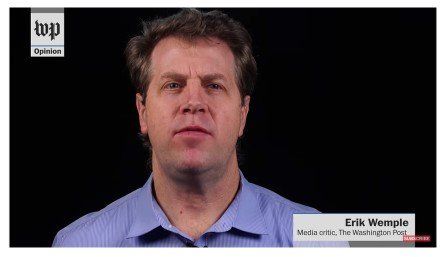
2.12 Did the BBC report on a nuclear war between NATO and Russia?
A convincing video purportedly showing a news report from the BBC about a nuclear incident between Russia and NATO forces was widely shared on the messaging service WhatsApp, as well as other social media platforms. The footage has since been removed from video-sharing services such as YouTube, but the fact-checking site Snopes
has compiled a few screenshots and quotes from the fictional report. (1:14 mins)
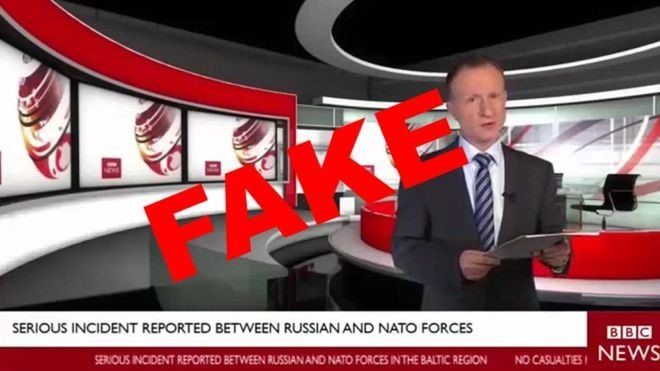
The original video was clearly labeled as a work of fiction. However, most viewers who encountered the footage (on or around 19 April 2018) watched an edited
version from which these disclaimers had been removed. Snopes
comments that "this isn’t the first time that a disclaimer has been removed from a video in order to make it appear genuine. Of course, these hoaxes typically involve somewhat less serious subjects than nuclear war, such as a clip of a surfer
being towed by a shark."
3 On Seeking Truth & Trust in an Era of Fake News
3.1 How can you burst your filter bubble?
It is always good to be open minded and look at other points of view. If you aren't listening to opposite points of view you may become close minded or not able to take other opinions on.
This video explains how you can break out of your 'echochamber' / pop your 'filter bubble'.
[3 Jun 2017; 1:51 mins]
This video explains how you can break out of your 'echochamber' / pop your 'filter bubble'.
[3 Jun 2017; 1:51 mins]
3.2 What we don't understand about trust
Philosopher Baroness O'Neill is interested in the role of trust in public life. Trust is on the decline, and we need to rebuild it. That's a commonly heard suggestion for making a better world, but, according to O'Neill, we don't really understand what we're suggesting. She flips the question, showing us that our three most common ideas about trust are actually misdirected."Watch the video
[Sep 2013; 9:40 mins] and or read a short explanation.
3.3 Truth Decay: fighting for facts and analysis [RAND Corporation]
Over the past two decades, national political and civil discourse in the US has been characterized by 'Truth Decay,' defined as a set of 4 interrelated trends: an increasing disagreement about facts and analytical interpretations of facts and data; a blurring of the line between opinion and fact; an increase in the relative volume, and resulting influence, of opinion and personal experience over fact; and lowered trust in formerly respected sources of factual information.
3.4 Edelman CEO "fake news is cancer in the bloodstream"
Richard Edelman (Edelman CEO) talks about the collapse of public trust in the social media platforms, and what has to happen if trust is to be restored. [6 Aug 2018; 5:58 mins] Watch it here. [Edelman published an annual 'Trust Barometer'.] [The accompanying article is about Facebook, Apple
and YouTube
removing pages and podcasts from the InfoWars
conspiracy theorist, Alex Jones, for hate speech policy violations.]
3.5 How to seek truth in an era of fake news
Known worldwide for her courage and clarity, Christiane Amanpour has spent the past three decades interviewing business, cultural and political leaders who have shaped history. In conversation with TED Curator Chris Anderson, Amanpour discusses fake news, objectivity in journalism, the leadership vacuum in global politics and more. "Be careful where you get information from," she says. "Unless we are all engaged as global citizens who appreciate the truth, who understand science, empirical evidence and facts, then we are going to be wandering around -- to a potential catastrophe." [Sept 2017; 17:58 mins]
3.6 Sam Harris - FAKE NEWS and moving forward with David Frum
Sam Harris, an atheist Liberal, speaks with David Frum, a religious NeoConservative, about how the country can move forward in this time of 'Fake News'. It's not a matter of arguing over what the facts means if you can't get access to anything other than propaganda. There is hope for us all when open dialogue and an exchange of honest ideas is allowed. [24 Feb 2017; 9:28 mins]
[David J Frum is a Canadian-American political commentator. He was a speechwriter for President George W. Bush.]
[David J Frum is a Canadian-American political commentator. He was a speechwriter for President George W. Bush.]
3.7 'The Assault on Intelligence'
Former CIA and NSA director Michael Hayden explains how Trump has thrived in a post-truth world. He is being interviewed on 'The One Show' about his new book, 'The Assault on Intelligence'. We make decisions based on emotion, preferences, allegiances, our tribe, grievances, not on facts...
Watch the video. [April 2018; 1:30 mins]
Watch the video. [April 2018; 1:30 mins]
3.8What makes people believe in conspiracy theories?
"According to new research published in the European Journal of Social Psychology,
there's a reason some individuals believe in wild conspiracy theories. Turns out avid conspiracy theorists, who believe the moon landing was faked, or the 9/11 attacks were a government cover up, or that Lizard people run the government, may be seeking attention. According to the study, many people enjoy believing in conspiracy theories because of an innate need for uniqueness." Watch the video.
[Oct 2017; 0:56 mins]
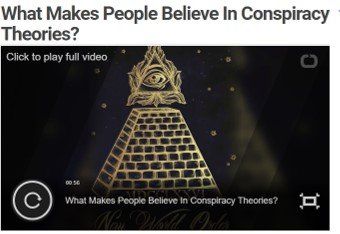
3.9 Conspiracy theories in an age of transparency
This lecture is part of a 5 year, interdisciplinary research project at Cambridge University
which aims to explore the whole idea of conspiracy theories [2]. It sets out not to debunk particular theories but to provide a 'natural history' of conspiracy theorising. To do that, the project "combines the perspectives, investigative methods and insights of historians, political theorists, network engineers and other disciplines to produce what we hope will be a deeper and richer understanding of a fascinating and puzzling phenomenon." [9 June 2016; 42:43 mins]
4 Grabbing & Keeping Our Attention
"The smartphone is possibly the largest source of influence over 2 billion people’s
thoughts that has ever been created.”
Tristan Harris
Some of the techniques used to get and keep our attention are analysed and discussed on a separate page.
4.1 The design tricks that get you hooked on your phone
"Feel like you have to always use your phone? You're not the only one - technology companies use psychological tricks to get you hooked to your phone. James Reevell explains."
Watch the video. [April 2018; 3:36 mins]
Watch the video. [April 2018; 3:36 mins]
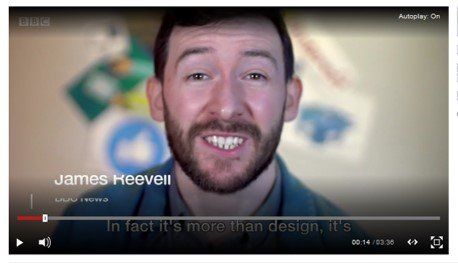
4.2 What everyone ought to know about Social Media
Modern technology is capable of persuading us to act in certain ways and cyberspace is constantly becoming more sophisticated and responsive to human interaction.
The methods highlighted in this video are just some of the ways we are being influenced and manipulated through social media. By being aware of them, we can alter our behaviour to make informed choices rather than just relying on our impulses, which can be taken advantage of. [19 Oct 2016; 8:37 mins]
The methods highlighted in this video are just some of the ways we are being influenced and manipulated through social media. By being aware of them, we can alter our behaviour to make informed choices rather than just relying on our impulses, which can be taken advantage of. [19 Oct 2016; 8:37 mins]
4.3 How your brain is getting hacked
People like to share. The Age of Social Media has got us sharing more and more about us. So why do we do it, and could we stop oourselves even if we tried?
This video explores how social media is targeting and manipulating people's minds. [17 Apr 2016; 4:49 mins]
This video explores how social media is targeting and manipulating people's minds. [17 Apr 2016; 4:49 mins]
4.4 Is social media messing with our emotions?
"Laurence Scott from Arcadia University believes that social media is changing the way that we express emotions."
Watch the video. [30 April 2018; 3:40 mins]
Watch the video. [30 April 2018; 3:40 mins]
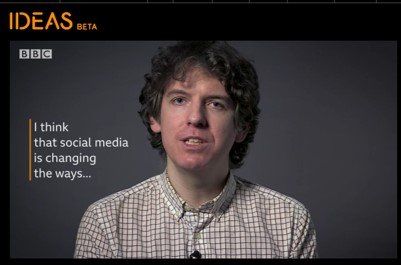
4.5 How a handful of tech companies control billions of minds every day
A handful of people working at a handful of tech companies steer the thoughts of billions of people every day, says design thinker Tristan Harris. From Facebook notifications to Snapstreaks to YouTube autoplays, they're all competing for one thing: your attention. Harris shares how these companies prey on our psychology for their own profit and calls for a design renaissance in which our tech instead encourages us to live out the timeline we want. [Apr 2017; 17:00 mins]You can read about this here. [Harris' profile]
Harris gave another TED talk
(in Dec 2014) entitled 'The Slot Machine in Your Pocket'. In it he argued that "Smartphone apps are addictive — by design. They take advantage of human weaknesses to ensure your constant attention. Harris is an expert on how technology hijacks our psychological vulnerabilities. He is also a magician and co-founder of the movement for Time Well Spent.
Until 2016, he was a 'product philosopher' at Google, where he studied how technology affects people's attention, well-being and behavior. You can read about this here.
4.6 Stand out of our light
In a reality that's flooded with fake news, identities and false realities, design ethicist James Williams argues that we need to redefine the way we use social media if we want to be more, well, social. Williams is co-founder of the Time Well Spent
campaign, an effort that aims to evolve the design ethos of digital technologies to help them be more respectful of our time and attention, and more supportive of our deeper human values and goals. [12 Sep 2017; 16:40 mins]
4.7 Alex Jones & InfoWars
Conspiracy theories are a good way to grab people's attention, and one of the masters of the genre is Alex Jones of InfoWars. The New York Times
has published an exposé
on Jones and his operation which described how Jones uses often bizarre stories and claims to sell various products (mainly to do with virility, health & survival) which raise millions of dollars for his secretive operation. The piece starts with a video
of Jones in action. Don't miss! Amongst Jones' many claims are that the Sandy Hook School
shooting never happened and that 9/11 was an inside job... [Jones is currently being sued for defamation.]
5 Data Collection & Manipulation on Social Media
5.1 Online security and privacy: What an email address reveals
"Michelle is surprised to see how much information is revealed by an online search of her email address despite her 'sporadic' use of social media. She spoke to Politics Live reporter Greg Dawson and Josh Smith, a researcher at Demos... who explained how useful this information could be for political campaigners." Watch the
video. [13 Nov 2018; 2:53 mins]
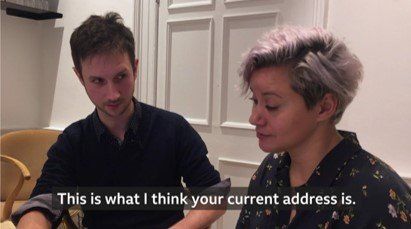
5.2 What is big data and how does it work?
One of the most common question in these days is what is big data and how does it actually works?
"Any time you go online you are producing data, and leave digital trace of information. All of these data is very complex, and there is so much of this it, coming from different sources and in real time. This is what we call 'Big Data', and in today's world business use this data to create customised and improved experience for their customers." [12 Dec 2017; 6:56 mins]
"Any time you go online you are producing data, and leave digital trace of information. All of these data is very complex, and there is so much of this it, coming from different sources and in real time. This is what we call 'Big Data', and in today's world business use this data to create customised and improved experience for their customers." [12 Dec 2017; 6:56 mins]
5.3 Big data
This video explains what is meant by big data and how big data is used and misused. [12 May 2015; 4:48 mins]
Privacy International is a non-profit that investigates the secret world of government surveillance and exposes the companies enabling it and litigate to ensure that surveillance is consistent with the rule of law. [3]
Privacy International is a non-profit that investigates the secret world of government surveillance and exposes the companies enabling it and litigate to ensure that surveillance is consistent with the rule of law. [3]
5.4 Data protection explained
Data protection is about understanding how our data is being used, with whom it is being shared, how long it is being stored, and when/if it will be deleted. Privacy ensures that democracy is maintained by allowing citizens to have safe spaces to discuss ideas, grow, and learn. [12 May 2015; 3:06 mins]
5.5 Facebook & You: WTF?
How much does Facebook
know about you? And should you be worried? Newsbeat's James Waterhouse lifts the lid on the data and privacy scandal costing them billions of pounds.
Since it came out that a personality quiz on Facebook
in 2014 may have led to the personal data of up to 87 million people being taken without their permission - then claims that the data was bought and used by Cambridge Analytica
for targeted advertising - a lot of people are concerned over what Facebook
knows about them. Watch this video. [10 Apr 2018; 6:42 mins]
5.6 How to fake a trend on Twitter
A BBC investigation has found Saudi Arabian companies offering to make hashtags trend artificially. Twitter
says it's trying hard to clamp down on automated accounts - or 'bots'. Watch this video.
[2 Mar 2018; 2:56 mins]
[2 Mar 2018; 2:56 mins]
5.7 Why it's so difficult for social media platforms to police fake accounts
Lawmakers slammed executives of social media companies at congressional hearings in November. They demanded to know why Russian operatives were allowed to purchase ads that reached millions of Americans before and during the presidential election. Wired's
editor, Nick Thompson, was interviewed on CBS
on how fake accounts are more damaging than political ads and why social media companies are having a tough time assessing the scope of the Russian influence operation.
View the video. [4 Nov 2017; 4:49 min]
View the video. [4 Nov 2017; 4:49 min]
5.8 470 fake news Facebook pages linked to Russia
Facebook
CEO Mark Zuckerberg says the social media giant is actively looking for fake accounts to shut them down. Giving evidence to a joint Senate hearing, Zuckerberg said the company shut down 470 accounts operated by a Russian organization named the Internet Research Agency
(which is based in St Petersburg). View the video. [10 Apr 2018; 2:19 mins]
6 Has Social Media Failed Society?
"Social media has become a space in which we form and build relationships, shape self-identity, express ourselves, and learn about the world around us; it is intrinsically linked to mental health."
Shirley Cramer, CEO Royal Society for Public Health
6.1 Your brain on social media
"It turns out the way we use social media changes the way our brains function."
Watch this video(by Julianne Pepitone) [21 Apr 2018; 2:11 mins]
Watch this video(by Julianne Pepitone) [21 Apr 2018; 2:11 mins]
6.2 Is social media good, bad or ugly?
Head-to-Head between UnHerd's Tech Editor, Nigel Cameron, and Tom Chivers moderated by Sally Chatterton. Cameron takes a largely sceptical line while Chivers is an optimist.
Listen to the podcast [21 Apr 2018; 14:35 mins]
Listen to the podcast [21 Apr 2018; 14:35 mins]
6.3 The Case Against Putting Children on Social Media
Even as social media feeds are littered with pictures of children, some parents are opting out.
Morgan Ames, a postdoctoral scholar at the Center for Science, Technology, Medicine, and Society, joins Tanya Rivero to discuss (Wall Street Journal). [23 May 2016; 4:13 mins]
Morgan Ames, a postdoctoral scholar at the Center for Science, Technology, Medicine, and Society, joins Tanya Rivero to discuss (Wall Street Journal). [23 May 2016; 4:13 mins]
6.4 What's your #StatusOfMind?
A Royal Society for Public Health
study
says that "social media may be fuelling a mental health crisis" in young people... Social platforms should flag up heavy social media use and identify users with mental health issues." The poll asked 1,479 people aged 14-24 to score popular apps on issues such as anxiety, depression, loneliness, bullying and body image. The report calls for action from government, social media companies and policy makers to "help promote the positive aspects of social media for young people, whilst mitigating the potential negatives. [4] [May 2017; 2:50 mins]
Instagram was rated as the worst social media platform
when it comes to its impact on young people's mental health. Instagram responded that keeping the platform a safe and supportive place for young people was "a top priority". It said it provided tools and information on how to cope with bullying and warns users before they view certain content.
6.5 How Lies Spread on Social Media
Rebecca Watson leads a team of skeptical female activists at Skepchick.org. She "travels around the world delivering entertaining talks on science, atheism, feminism, and skepticism. There is currently an asteroid orbiting the sun with her name on it." Here she talks about how lies spread on social media — as she says (quoting Swift) "“Falsehood flies, and truth comes limping after it." [20 Nov 2016; 3:45 mins]
6.6 Using facial recognition to identify strangers
Twenty-one-year-old Egor Tsvetkov has carried out an experiment to show how easy it is to identify complete strangers.
The Russian photography student took photos of people in public places and then tracked them down on the Russian social media site VKontakte using a facial recognition app. The experiment 'Your Face Is Big Data' was published online and has been viewed by more than 70,000 times. [12 Apr 2017; 1:52 mins]
The Russian photography student took photos of people in public places and then tracked them down on the Russian social media site VKontakte using a facial recognition app. The experiment 'Your Face Is Big Data' was published online and has been viewed by more than 70,000 times. [12 Apr 2017; 1:52 mins]
6.7 Seal's social media and technology crisis
Singer Seal is in crisis: the Grammy-winning artist says he's deeply concerned about the prevalence of what he sees as emotionless technology and anti-social social media...
Watch his interview. [21 Nov. 2017; 2:00 mins]
Watch his interview. [21 Nov. 2017; 2:00 mins]
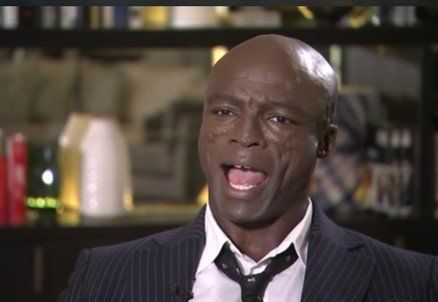
6.8 Social media is ripping society apart says former Facebook exec
Former Facebook
exec. Chamath Palihapitiya says "social media is ripping society apart” and feels “tremendous guilt.” He is speaking here a Stanford Business School
in Nov. 2017. “This is not about Russian ads,” he says, “this is a global problem. It is eroding the core foundations of how people behave by and between each other.” “I can’t control them,” Palihapitiya said (of Facebook) “I can control my decision, which is that I don’t use that shit. I can control my kids’ decisions, which is that they’re not allowed to use that shit. I think we have created tools that are ripping apart the social fabric of how society works.” [19 Dec. 2017; 13:06 mins]
6.9 Quit social media
Dr Cal Newport argues that 'deep work' will make you better at what you do; you will achieve more in less time; and feel the sense of true fulfillment that comes from the mastery of a skill. Newport is an Assistant Professor of Computer Science at Georgetown University. In addition to studying the theoretical foundations of our digital age, Newport also writes about the impact of these technologies on the world of work. His most recent book, 'Deep Work', argues that focus is the new IQ in the modern workplace, and that the ability to concentrate without distraction is becoming increasingly valuable. [16 Sept 2016; 13:50 mins]
6.10 Meet people who review Facebook's reported content
The release of Facebook's content moderation guidelines has drawn attention to the difficult work of those whose job it is to review the material. The company says psychological help is available to all its moderators 24 hours a day. Angus Crawford spoke to one woman about the impact of a job where you look at some of the worst material the web has to offer. [26 Apr 2018]
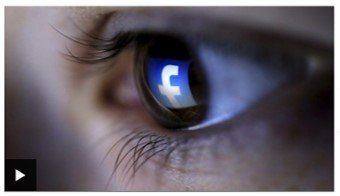
7 Legal Challenges to Social Media
7.1 The case against Google
Critics say the search giant is squelching competition before it begins. Should the government step in? Charles Duhigg, New York Times Magazine, here discusses his article
about concern over Google
allegedly halting other innovation.
View video. [21 Feb 2018; 5:20 min]
View video. [21 Feb 2018; 5:20 min]
7.2 Facebook Faces a Lawsuit Over Face-Tagging in Photos
The last thing Facebook needs is another lawsuit... A federal judge has ruled that millions of Facebook users can join together in a suit over biometric data. Users claim Facebook's photoscanning technology violates Illinois State Law by gathering and storing the data without their consent. The law in question is the Illionois Biometric Information Privacy Act of 2008...
View video. [17 Apr 2018; 1:00 min]
View video. [17 Apr 2018; 1:00 min]
7.3 Martin Lewis seeks damages for 'fake' Facebook ads
Consumer campaigner Martin Lewis is to launch UK High Court proceedings in a bid to sue Facebook
for defamation. The founder of MoneySavingExpert
says at least 50 fake ads bearing his name have appeared on the social media platform, causing reputational damage to him. Many of the adverts show his face alongside endorsements that he has not actually made, and often link to articles carrying false information. Facebook
says misleading ads are not allowed and any reported are removed. View Lewis's video. [23 Apr 2018; 0:51 mins] TOP
8 The Manipulation of Speech and Video
Computer scientists have already shown that they are able to mimic voices and manipulate video footage to have people’s lips moving in sync with any text you care to use — one new fakeapp
enables hackers to change the face on a video, perhaps substituting the face of a famous actress or former girlfriend onto an adult video, for titillation or revenge. There is more discussion about this on the Deepfake page.
8.1 Hear Google's virtual assistant mimic a human voice to book an appointment by phone
"Google's CEO, Sundar Pichai, introduces a new robotic assistant in his keynote address to Google's 2018 conference in California on Tuesday. The virtual assistant, powered by Google Duplex, uses a very natural speech pattern that includes interjections such as 'er' and 'mmm-hmm' so that it sounds eerily lifelike. Google's robot assistant now makes eerily lifelike phone calls for you." [9 May 2018; 0:49 mins]
8.2 Deepfake Videos Are Getting Real and That’s a Problem | Moving Upstream
"Computer-generated videos are getting more realistic and even harder to detect thanks to deep learning and artificial intelligence. As WSJ’s Jason Bellini finds in this episode of Moving Upstream, these so-called deepfakes can be playful, but can also have real, damaging consequences for people’s lives."
[Wall Street Journal; 15 Oct 2018; 9:59 mins]
[The video had been viewed almost 600,000 times in 1 month.]
8.3 Adobel's Voco ('Photoshop for Voice')
This video shows how recordings can be 'photoshopped'. #VoCo allows you to change words in a voiceover simply by typing new words.
Presented live during the Adobe MAX 2016 Sneak Peeks, co-hosted by Jordan Peele. [4 Nov 2016; 7:20 mins]
8.4 #ProjectCloak | Adobe Creative Cloud
Cloak is "content-aware-fill for video, and powered by Adobe Sensei. It enables removing unwanted things from a video by imagining what would appear if these unwanted things were removed. This is a look at early technology from Adobe. These may or may not be features and/or new products we integrate down the line." Awesome. [21 Nov 2017; 6:13 mins]
8.5 Translating images [by Nvidia]
There are algorithms for image translation that enable users to alter the weather or time of day in a video, like this example developed by chip manufacturer Nvidia. In the images shown, the left image is the original, the right, the translated version — day to night; fine to wet.
These algorithms could be used for post-production of movie scenes shot during days with different weather. But this could be problematic for newsrooms and others, because in order to verify footage and narrow down when videos were filmed, it is common to examine the time of day, weather, position of the sun, and other indicators for clues to inconsistencies.
8.6 Actor or Algorithm?
Could you distinguish a computer-generated Donald Trump from the real thing or a professional impersonator? ASI Data Science
has created an algorithm that could take any text and read it in the voice of the US president.People were challenged to see whether they could tell the actor from the algorithm (and did badly). Watch/Listen to video. [4 Sept 2018; 2:33 mins]
8.7 Looksery facial modification in real time
Looksery is an American software and photography company. The company developed an application that does facial modification of photos in real time on mobile platforms. Watch video. [23 May 2014; 1:44 mins]
[SnapChat purchased Looksery in 2015, and its software then become its landmark lenses function.]
[SnapChat purchased Looksery in 2015, and its software then become its landmark lenses function.]
8.8 How artificial intelligence can edit your pictures
Researchers at MIT Csail have "created an artificial intelligence that makes editing your pictures simpler. The system uses semantic soft segmentation which automatically separates objects in a picture." Just think about how this technology is going to be used...
View video here. [12 Sept 2018; 1:18 mins]
8.9 The disturbing YouTube videos that are tricking children
Trending found a number of YouTube channels have fake versions of popular cartoons, often with scenes unsuitable for young children. [27 Mar 2017; 2:15 mins]
8.10 Augmented Reality
This is a very brief but fascinating introduction to augmented reality — Wikpedia
describes Augmented Reality
(AR) as "an interactive experience of a real-world environment whereby the objects that reside in the real-world are 'augmented' by computer-generated perceptual information, sometimes across multiple sensory modalities, including visual, auditory, haptic, somatosensory, and olfactory." [2 Oct 2017; 1:09 mins]
With AR the "overlaid sensory information can be constructive (i.e. additive to the natural environment) or destructive (i.e. masking of the natural environment) and is seamlessly interwoven with the physical world such that it is perceived as an immersive aspect of the real environment." AR "alters one’s ongoing perception of a real world environment, whereas virtual reality completely replaces the user's real world environment with a simulated one."
9 Facial Recognition & Artifical Intelligence
9.1 What is AI?
"A computer can beat the world chess champion and understand voice commands on your smartphone, but real artificial intelligence has yet to arrive. The pace of change is quickening, though. Some people say it will save humanity, even make us immortal. Others say it could destroy us all. But, the truth is, most of us don't really know what AI is." Watch the video[produced by Valery Eremenko]. [13 Sept 2015; 1:57 mins]
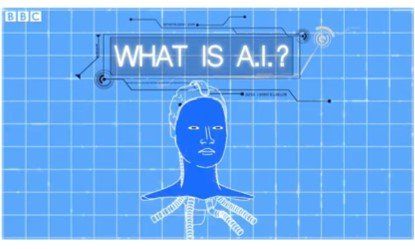
9.2 Artificial Intelligence
"Computers do a lot for us these days and can sometimes seem intelligent like a person. But really, they’re more like calculators. Most only do exactly what we program them to do and nothing more. But this may change in the future. Today researchers are working on artificial intelligence which has the goal of making computers seem to be as intelligent as humans."
Watch the video [3:15 mins; website also has transcript].
Watch the video [3:15 mins; website also has transcript].
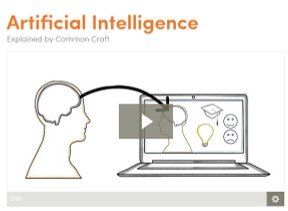
9.3 Facial recognition: The future of marketing, security and your privacy
Advocates are pushing for facial recognition software to be used on the mass consumer market, to tailor marketing to the individual, but how much will this compromise our privacy?
[ABC News Australia; 10 Sep 2015; 6:44 mins]
[ABC News Australia; 10 Sep 2015; 6:44 mins]
9.4 Do you trust this computer?
Science fiction has long anticipated the rise of machine intelligence. Today, a new generation of self-learning computers has begun to reshape every aspect of our lives. Incomprehensible amounts of data are being created, interpreted, and fed back to us in a tsunami of apps, personal assistants, smart devices, and targeted advertisements. Virtually every industry on earth is experiencing this transformation, from job automation, to medical diagnostics, even military operations.

'Do You Trust This Computer?' explores the promises and perils of our new era. Will A.I. usher in an age of unprecedented potential, or prove to be our final invention? Watch the trailer. [Apr 2018; 1:35 mins] [PS: Take a look at the 'experts' pulldown for the people behind this film.]
9.5 Elon Musk - How AI is dangerous
Tesla and SpaceX CEO Elon Musk says AI represents a ‘fundamental risk to human civilisation’ and that waiting for something bad to happen is not an option. Musk is pushing
for the proactive regulation of artificial intelligence because “by the time we are reactive in AI regulation, it’s too late”.
[The School of Self Interview 30 Dec 2017; 4:06 mins.]
[The School of Self Interview 30 Dec 2017; 4:06 mins.]
9.6 Five reasons why robots won’t take over the world
Not everyone agrees with the pessimists. This paper
argues that "the pessimists can relax and the optimists need to cool their boots." It is written by people who describe themselves as "experts in the field of robotics," who "believe that robots will be much more visible in the future, but – at least over the next two decades – they will be clearly recognisable as machines. This is because there is still a long way to go before robots will be able to match a number of fundamental human skills." They then proceed to list "five reasons why robots aren’t about to take over the world." Super video by Boston Dynamics. [18 Apr 2018; 0:45 mins]
10 Reflexive Control & Disinformation
10.1 DisinfoPortal [Atlantic Council]
This is a "one-stop interactive online portal
and guide to the Kremlin’s information war." It aggregates open source research and journalism from the US and Europe and combines it with material produced by the Atlantic Council
and its partners explaining Russia’s ongoing influence operations. The Portal offers a database of country-specific researchers and organizations who are willing to answer questions on disinformation threats posed by state and non-state actors, complementing existing counter-disinformation efforts across the transatlantic community. [8 Mar 2018; 0:54 mins]
10.2 Russia's strategy of 'Reflexive Control'
In this disturbing talk, cybersecurity expert Laura Galante, argues that Russia's strategy of 'reflexive control' exploited the public's brains in the 2016 election. She argues that "hacking, fake news, information bubbles and more, have become part of the vernacular in recent years" and that "the real target of anyone looking to influence geopolitics is dastardly simple: it's you." Watch this TED Talk. [Apr 2017; 9:34 mins] [Laura's profile]
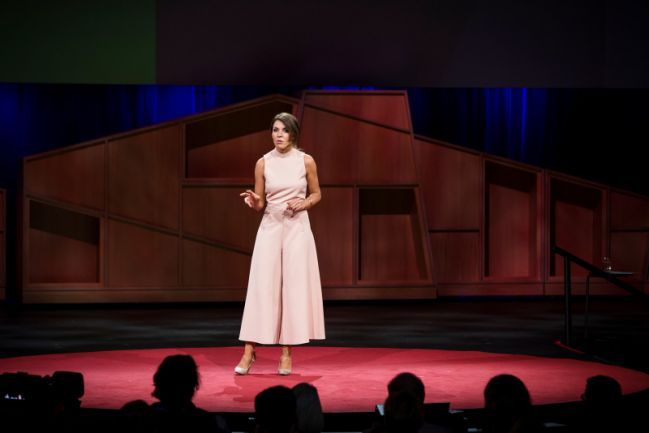
10.3 The 4 Ds of Disinformation [Ben Nimmo & Liz Wahl]
This is one of the sessions at the Atlantic Council's Digital Forensic Research Lab
held in Berlin in June 2018 ('360/Open Source'). The 4 Ds are Dismiss, Distort, Distract and Dismay. You can read more about the 4Ds here. [22 Jun 2018; 22:37 mins]
Ben Nimmo was one of the founders of the DFRLab; Liz Wahl is an American reporter who made a name for herself when, as an anchor at the Russian network RT's Washington bureau, she quit live on air.
10.4 How to identify trolls
This video is produced by EU vs Disinformation, which was set up after the EU Heads of State and Government stressed [in Mar. 2015] the need to challenge Russia’s ongoing disinformation campaigns. It's website is part of "a campaign to better forecast, address and respond to pro-Kremlin disinformation. The initiative is run by the European External Action Service East Stratcom Task Force. Watch the video. [3 Jan 2018; 0:50 mins]
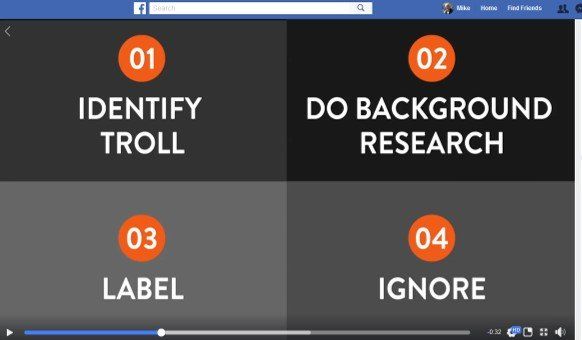
10.5 How Russian operatives used social media to divide America
On 1 Nov. 2017 the US House Intelligence Committee
released social media advertisements that were pushed by Russian groups to influence the 2016 presidential election.
View the video
[2:14 mins;Note: it may take some seconds to load; be patient...]

10.6 The Seven Commandments of Fake News
In the second episode of the 'Operation Infektion' series, the New York Times
demonstrates how even the most outrageous lie can be turned into a successful fake news story. All you would have to do is follow the Seven Commandments of Fake News – a step-by-step guide straight from the Kremlin’s recipe book, on how to cook up the perfect media storm:
1: look for cracks in target societies.
2: create a big lie – something so outrageous, no one will believe it is made up.
3: wrap that lie around a kernel of truth – disinformation is most successful when it has a small bit of truth in it.
4: conceal your hand – make it seem that the story came from somewhere else.
5: find yourself a ‘useful idiot’ – someone who would unwittingly push your message to wider audiences.
6: when truth is uncovered – deny everything.
7: play the long game – efforts might not bear fruit for years, but accumulated over a longer period of time they will eventually have a political impact. [Watch the video here. 13 Nov 2018; 14:16 mins]
2: create a big lie – something so outrageous, no one will believe it is made up.
3: wrap that lie around a kernel of truth – disinformation is most successful when it has a small bit of truth in it.
4: conceal your hand – make it seem that the story came from somewhere else.
5: find yourself a ‘useful idiot’ – someone who would unwittingly push your message to wider audiences.
6: when truth is uncovered – deny everything.
7: play the long game – efforts might not bear fruit for years, but accumulated over a longer period of time they will eventually have a political impact. [Watch the video here. 13 Nov 2018; 14:16 mins]
10.7 Are we entering a new Cold War?
In Episode 17 of the LSE IQ podcast, Joanna Bale talks to LSE's Anne Applebaum, Cristian Nitoiu and Peter Pomerantsev about Russia's use of reflexive control to undermine Western democracy in the new era of 'Cold Peace'. An insightful, often disturbing analysis. Podcast available here
[8 Aug 2018; 46 mins].

11 The Social Impact of New Technology
In this section we compare and contrast some rather different perspectives on social media and the impact of fake news and mis/disinformation.
11.1 The power of social media
"For most of human history the rules of power were clear: power was something to be seized, and then jealously guarded. Under this 'Old Power' we lived in a world of rulers and subjects. Now, we all sense that something has changed. From #MeToo to Harvey Weinstein; Corbyn to Trump; from YouTube sensations to darker phenomena such as the emergence of ISIS – in our new hyper-connected world, ideas and movements can spread and flourish with astonishing force and speed."
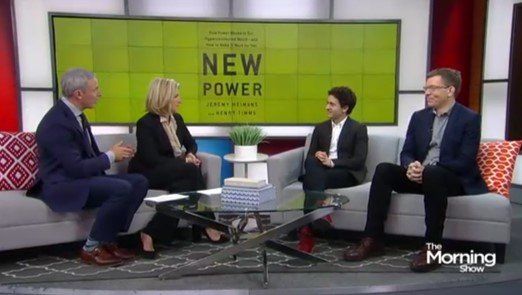
In this interview, authors Heimans and Timms talk about the power behind social movements in their new book, 'New Power', in which they "confront the biggest story of our age and trace how New Power is the key to understanding where we are and will prosper in the 21st Century." To do this they draw on examples from business, politics, popular culture and social justice, and case studies of organisations like LEGO
and TED, to explain the forces that are changing the course of our age. Watch the interview [11 Apr 2018; 4:48 mins] or this clipif you prefer a racy overview. [6]
11.2 The visionary behind Virtual Reality: Jaron Lanier
Jaron Lanier, the founding father of Virtual Reality, shares his views on the future of IT. "Almost everybody is really unhappy with how digital services are being used now." He suggests we should pay small amounts for online services in order to remove the financial incentives of online advertising. "We cannot have a society in which, if two people wish to communicate, the only way that can happen is if it's financed by a third person who wishes to manipulate them." [24 Jan 2018; 5:01 mins]
11.3 Barack Obama: fake news is a threat to democracy
President Obama denounced the spate of misinformation across social media platforms, including Facebook, suggesting American politics could be affected.
“If we are not serious about facts and what’s true and what’s not, if we can’t discriminate between serious arguments and propaganda, then we have problems,” he said during a press conference in Germany. Watch the video. [18 Nov 2016; 2:05 mins]
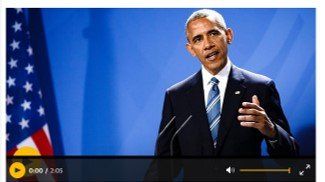
11.4 The Internet, Fake News, and Democracy
New York Magazine's Max Read discusses the rise of 'fake news' and whether the internet is a reliable tool for furthering democracy. Watch the video. [30 Nov 2016; 4:48 mins]
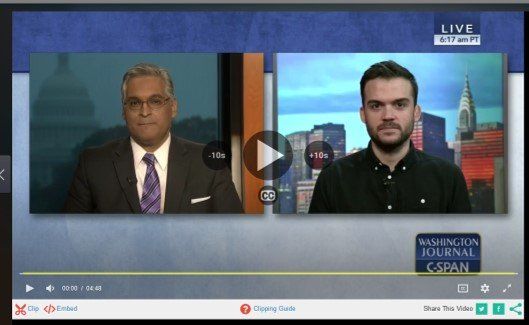
11.5 Will technology destroy our democracy?
"Institutions and regulations — like a free press, an informed citizenry, rules about election advertising — keep democracy working. All voters get the same facts and messages. But big data analysis is now enabling politicians to target voters individually with highly targeted messaging that regulators can’t easily see, exploiting people's psychological vulnerabilities."[7] [Apr 2018]
11.6 Democracy, Hijacked [Madeleine Albright]
Madeleine Albright, former US Secretary of State, delivers the keynote address at the Atlantic Council's 360 / Open Source Summit in Berlin, Germany.* The event brought together 170 activists, journalists, innovators and policy-makers from around the world as part of the Council's digital solidarity movement for objective facts and reality. There were two days of interactive sessions and hands-on training.
Madeleine Albright's message is stark:
“Leaders who play by the rules are having trouble staying ahead of a relentless news cycle and must devote too much effort trying to disprove stories that seem to come out of nowhere and have been invented solely to do them in. All this has consequences, which is why people who once heralded the birth of the social media age are now wondering whether democracy can survive it.”
* For most of the sessions the speakers were in the centre surrounded by the attendees, hence the 360 (degrees) in the title. [23 Jun 2018; 13:44 mins]
12 The Tech Giants Respond to Criticism
'We need to do more.'
Google
(on misinformation)
This section is relatively new and includes information on how the various tech giants are responding to the criticism — and threats from advertisers [8] — that they are not doing enough to combat fake news and disinformation.In March 2018 Facebook
announced a major change in policy and subsequently published a useful video on the topic; and Google
has taken action to help promote quality journalism. We are hoping to be able to grow this section in the months ahead...
12.1 Facing facts [Facebook]
"Fake news is bad for people and bad for Facebook. It has long been a tool for economic or political gains, and we’re seeing new ways it’s taking shape online. We’re making significant investments to stop fake news from spreading and to promote high-quality journalism and news literacy." Watch the video (~July 2018; 11:47 mins).
Facebook's strategy has three parts: 1) remove
accounts and content that violate our Community Standards or ad policies; 2) reduce
the distribution of fake news and inauthentic content, like clickbait; and 3) inform
people by giving them more context on the posts they see. You can read more about the strategy here.
You can also watch / listen to Mark Zuckerberg apologising in the video. [22 Mar 2018; 6:31 mins]
Facebook's Global Politics & Government Outreach, Director Katie Harbath, spoke at the Atlantic Council's 360/OS event in Berlin about protecting election integrity, and Facebook's attempts to build digital resilience against fake news.
[23 Jun 2018; 13:55 mins]
Facebook
said recentlythat it would not remove fake news that did not break its rules but would down-rank content that had been marked as false... "We allow people to post it as a form of expression, but we're not going to show it at the top of News Feed."

In August 2018, Facebook introduced a new requirement
for pages with a large audience in the US; they must complete a two-factor authentication process and confirm their primary country location, making it harder for people to administer a Page using a fake or compromised account. Facebook
says that Instagram
will shortly introduce a similar requirement.
12.2 Google News Initiative
The Google News initiative
(GNI) is Google's "company-wide effort to help journalism thrive in a digital age. It brings together everything we do across products, partnerships and program to build a better future for news. Our goals are threefold: 1) to evolve new business models to support quality journalism; 2) to strengthen and elevate quality journalism; and 3) to empower news organizations to leverage technology for innovation in newsrooms." [20 Mar 2018; 1:47 mins] The Initiative is discussed in more detail here.
Some years ago Google
produced a very useful tool for checking on images. It is nicely explained in this short video. [13 May 2015; 1:39 mins] In 2016 it lauched a fact check facility, which it said would "shine a light on its efforts to divide fact from fiction". Google's head of news, Richard Gingras, added that this would "help readers find fact checking in large news stories".
This clip of Google's chief privacy officer, Keith Enright, facing questions from Senator Ted Cruz about Google's intention to launch a new search engine in China ('Project Dragonfly') doesn't show Google
in a good light. Indeed, Enright is downright evasive. However, Enright does confirm to Cruz that the Project exists although he says it is "not close to launch". At the time of posting the video is not available on YouTube
but it can be viewed on the BBC's website
[26 Sep 2018; 2:41 mins]. Do read the commentary...
12.3 YouTube
YouTube
has announced plans
to push videos from more 'authoritative' sources. Its recommendation engine has been "tweaked so that news-related searches will show results from more reliable outlets." It
is to invest $25m to improve its news features, joining its parent company Google, as well as Facebook
& Apple, in campaigns to stem fake news ahead of the US midterm elections. In the video The FT's media industry experts discuss what impact the changes may have. [11 July 2018; 2:48 mins]
12.4 Twitter
Twitter
Cofounder Ev Williams (now CEO of Medium) acknowledges some of the problems created by fake information on Twitter
and believes there are ways for platforms to be advertising-funded and still keep their integrity. [9 Apr 2018; 1:44 mins] Some possible Twitter
initiatives are discussed in more detail here. While Twitter
is happy to serve as a platform for fact-checkers, it does not want to get into the business of making its own judgments about what is true or false.
“We are not the arbiters of truth,” says Nick Pickles
(Twitter's head of public policy for the UK), “we are not going to remove content based on the fact this is untrue. The one strength that Twitter has is it's a hive of journalists, of citizens, of activists correcting the record, correcting information.”
In early July 2018 it was reported
that Twitter
suspended 70 million accounts in May and June in its ongoing battle against misinformation and other abuse on the social network. That's more than one million accounts per day.
12.5 Apple
In early 2017 Tim Cook, Apple's CEO, called for governments to launch a public information campaign to fight the scourge of fake news, which is “killing people’s minds”. He said
that the epidemic of false reports “is a big problem in a lot of the world” and necessitates a crackdown by the authorities and technology firms. More recently Cook has argued "You don't change the world by being quiet on things that matter... It's not enough to be a large company." Watch the video (25 Jun 2018; 3:02 mins).
13 Practical Examples of People Fighting Fake
This section is new. It will contain some practical examples of how people are 'fighting fake'. It will take a little time for us to provide a balanced selection so please be patient. The videos below are in no particular order. If you can suggest suitable items, please do!
13.1 Checking on the Fact-Checkers
Poynter
oversees a code of principles for the International Fact-Checking Network
— a series of commitments that organizations must abide by before they are registered as exemplars in fact-checking. [~July 2018; 1:53 mins]
13.2 How Wikipedia founder Jimmy Wales is Fighting Fake News
Jimmy Wales, co-founder of Wikipedia, explains why quality journalism is disappearing, and how he's tackling a broken business model with his news project WikiTribune
(which is funded by crowdfunding). Tackles a wide range of issues, such as his insistence on NPV (Neutral Point of View) which Wales considers non-negotiatble.
He is interviewed here by Oli Franklin-Wallis of WIRED. [23 Jan 2018; 32:56 mins]
13.3 R00tz Asylum ['Hacking for good']
r00tz Asylum
is a US nonprofit dedicated to "teaching kids around the world how to love being white-hat hackers. A white-hat hacker is someone who enjoys thinking of innovative new ways to make, break and use anything to create a better world.... Through hands-on workshops and games, kids learn reverse engineering, soldering, cryptography and how to responsibly disclose security bugs."
Watch video here. In it 11 yr old Bianca Lewis is taking part in a competition to try and hack into the American voting system. Her aim is to see if she can reduce the number of votes for Donald Trump! Another 11 yr old, Audrey Jones, took just 10 mins to break through one site's defences... [11 Aug 18; 1:59 mins] You will find more videos about r00tz Asylum's work with children on its website.
13.4 EUvsDisinfo.eu — debunking & publicising fake news stories
The EUvsDisinfo.eu website
describes itself as "the only searchable database of fake news." This website (today, Aug 2018) has more than 4,200 cases of what it considers "pro-Kremlin disinformation." [11 Sept 2017; 0:55 mins]
14 The Battle for the Web / Internet
This section provide information on some of the oganisations fighting to protect the world wide web. If you'd like to can suggest suitable items, please do!
14.1 #For the Web [World Wide Web Foundation]
The World Wide Web Foundation
has launched a #ForTheWeb
campaign to save the Web. Here's an extract from the website: "The free and open web is facing real challenges. More than half of the world’s population still are not online. For the other half, the web’s undeniable benefits seem to come with far too many unacceptable risks: to our privacy, our democracy, even our mental health." [5 Nov 2018; 1:575 mins] To accompany and support the Campaign, the Foundation
has launched a report: 'The Case for the Web'.
The Report
"reflects on what the web has allowed humanity to accomplish over the past nearly 30 years, examines the current trends that threaten its future, and outlines actions we must take to reverse these trends and ensure that the web remains free and open for everyone."
The threats facing the web "are many and multi-faceted. Over half the world’s population is still offline, and the growth of people coming online is slowing dramatically. The distributed power of the web has shifted to lay in the hands of just a few, online abuse is on the rise, and the content we see is increasingly susceptible to manipulation. Over 1.2 billion internet users live in countries where net neutrality is not protected, and more than 1.5 billion people live in countries with no comprehensive law on personal data protection, leaving them particularly vulnerable to increasingly common incidents involving breaches of personal data."
The report "outlines a number of policy recommendations in support of the process to build a Contract for the Web, which will define responsibilities that governments, companies and citizens each have to create a better web."
14.2 International Declaration on Information and Democracy [Reporters Without Borders]
On 2 Nov 2018 the Information & Democrcy Commission
released an 'International Declaration on Information & Democracy,' which "establishes democratic guarantees for the global information and communication space. An open and free internet is clearly an important part of such a space."
The Declaration notes that "the global communication and information space is a common good of humankind and should be protected as such. Its management is the responsibility of humankind in its entirety, through democratic institutions, with the aim of facilitating real communication between individuals, culture, peoples and nations, in the service of human rights, civil concord, peace, life and the environment."
Here's a short extract: "Reliable information underpins the exercise of freedom of opinion, respect for other human rights and all democratic practices, including deliberation, elections, decision-making and accountability. The integrity of the democratic process is violated when information that could influence this process is manipulated. The right to information consists of the freedom to seek, receive and access reliable information. Information can only be regarded as reliable when freely gathered, processed and disseminated according to the principles of commitment to truth, plurality of viewpoints and rational methods of establishment and verification of facts."
14.3 Freedom on the Net [Freedom House]
"The internet is growing less free around the world, and democracy itself is withering under its influence."
This chilling report
has just been released — the video is from the launch and involves contributions from some of the main US thinkers and writers on disinformation. [5 Nov 2018; 01:36:48 mins]
Here are a couple of extracts: "Disinformation and propaganda disseminated online have poisoned the public sphere. The unbridled collection of personal data has broken down traditional notions of privacy. And a cohort of countries is moving toward digital authoritarianism by embracing the Chinese model of extensive censorship and automated surveillance systems. As a result of these trends, global internet freedom declined for the eighth consecutive year in 2018."
"If democracy is to survive the digital age, technology companies, governments, and civil society must work together to find real solutions to the problems of social media manipulation and abusive data collection. Multilateral and cross-sectoral coordination is required to promote digital literacy, identify malicious actors, and deny them the tools to fraudulently amplify their voices. When it comes to protecting data, users must be granted the power to ward off undue intrusions into their personal lives by both the government and corporations. Global internet freedom can and should be the antidote to digital authoritarianism. The health of the world’s democracies depends on it."
Notes
1 We are very aware that much of what is posted on this page is highly critical of social media. There are many videos on the web that sing the praises of social media, but most of them are several years old. More recent videos seem to focus on the pros AND the cons; and a growing number condemn the whole idea and encouraging people to kick the habit. Clearly social media is not going away any time soon; the question we have been wrestling with is whether it is possible to prevent the cynical manipulation of social media and somehow moderate the ways in which it is used so as to reduce the damage to people’s mental health and the adverse effects it is having on the democratic process.
To provide a bit more ballance, here are a couple of well-written articles extolling the benefits of social media: '10 Reasons Why Social Media Is Great For Teenagers' and 'Benefits of Social Media' [16 Oct 2016]
2 "Theories and beliefs about conspiracies are an enduring feature of modern societies. This is partly a reflection of the fact that real conspiracies do exist, and have existed in the past. But the pervasiveness of conspiracy theories in the twenty-first century suggests that many other factors are also at work, And studying them provides opportunities for understanding how people make sense of the world and how societies function. What does the prevalence of conspiracy theories tell us about trust in democratic societies, and about the differences between cultures and societies? How have conspiracies and conspiracy theorising changed over the centuries and what, if any, is the relationship between them? Have conspiracy theories appeared at particular moments in history, and why?" [For more information see here.]
3 Privacy International advocates for strong national, regional, and international laws that protect privacy. It conducts research to catalyse policy change. It raises awareness about technologies and laws that place privacy at risk, to ensure that the public is informed and engaged. To ensure that this right is universally respected, it strengthens the capacity of its partners in developing countries and works with international organisations to protect the most vulnerable.
4 The RSPH Report's recommendations include: a) Introduction of a pop-up heavy usage warning on social media – include the support from young people for each of these recommendations; b) Social media platforms to identify users who could be suffering from mental health problems by their posts, and discretely signpost to support; and c) Social media platforms to highlight when photos of people have been digitally manipulated.
5 According to the originators, this has been achieved "using Tensor Flow Machine Learning to swap faces ~ 870 Training images used ~ 1000 frames ~ 10 hours training time..."
To provide a bit more ballance, here are a couple of well-written articles extolling the benefits of social media: '10 Reasons Why Social Media Is Great For Teenagers' and 'Benefits of Social Media' [16 Oct 2016]
2 "Theories and beliefs about conspiracies are an enduring feature of modern societies. This is partly a reflection of the fact that real conspiracies do exist, and have existed in the past. But the pervasiveness of conspiracy theories in the twenty-first century suggests that many other factors are also at work, And studying them provides opportunities for understanding how people make sense of the world and how societies function. What does the prevalence of conspiracy theories tell us about trust in democratic societies, and about the differences between cultures and societies? How have conspiracies and conspiracy theorising changed over the centuries and what, if any, is the relationship between them? Have conspiracy theories appeared at particular moments in history, and why?" [For more information see here.]
3 Privacy International advocates for strong national, regional, and international laws that protect privacy. It conducts research to catalyse policy change. It raises awareness about technologies and laws that place privacy at risk, to ensure that the public is informed and engaged. To ensure that this right is universally respected, it strengthens the capacity of its partners in developing countries and works with international organisations to protect the most vulnerable.
4 The RSPH Report's recommendations include: a) Introduction of a pop-up heavy usage warning on social media – include the support from young people for each of these recommendations; b) Social media platforms to identify users who could be suffering from mental health problems by their posts, and discretely signpost to support; and c) Social media platforms to highlight when photos of people have been digitally manipulated.
5 According to the originators, this has been achieved "using Tensor Flow Machine Learning to swap faces ~ 870 Training images used ~ 1000 frames ~ 10 hours training time..."
6 'New Power' is an insightful and thoughtful examination of how power is shifting in today’s world and how organizations can navigate the new landscape to help people. Here’s the essence of Heimans and Timms' argument:
a) the nature of power is changing — with the growth of social media and new technology, more people than ever before are able to make their voices heard and play a role in solving problems. ‘New power’ is where power is shared broadly by many, with transparency, engagement, and ownership;
a) the nature of power is changing — with the growth of social media and new technology, more people than ever before are able to make their voices heard and play a role in solving problems. ‘New power’ is where power is shared broadly by many, with transparency, engagement, and ownership;
b) the goal with new power is not to hoard it but to channel it
— the authors argue that we can grow movements for change by empowering more people to be champions of global solutions. Rather than advocating on their behalf, we can help by raising awareness of issues, connecting them to solutions, and equipping them with the information they need to advocate for change;
c) collaboration is a hallmark of new power — this is the key to any ‘new power’ approach; cooperation also brings more ideas, expertise and resources to the table, helping us go farther and faster in reaching our goals.
c) collaboration is a hallmark of new power — this is the key to any ‘new power’ approach; cooperation also brings more ideas, expertise and resources to the table, helping us go farther and faster in reaching our goals.
7 The video summarises the main message in Jamie Barlett's new book: ‘The People versus Tech’ (2018; Ebury Press). In the video he points out that: "Democracies need citizens with a shared sense of reality. But we are now overwhelmed with information — facts, claims, misinformation and propaganda — and it's allowing us to create our own versions of reality. That's making us more angry, and far less likely to compromise with each other. In the end, there can only be one winner of this grand struggle: either tech will destroy the social order as we know it, or politics will stamp its authority and control over the digital revolution. On the current track, technology is winning — and unless things change, democracy will be washed away."
8 In Feb 2018 one of the world's biggest advertisers, Unilever,
threatened to pull advertising
spend with tech giants Google, Facebook, and Twitter over toxic culture and fake news. Unilever
would not invest in "platforms or environments that do not protect our children or which create division in society, and promote anger or hate. We will prioritise investing only in responsible platforms that are committed to creating a positive impact in society." In 2017 several major brands pulled their advertising from Google
after it was found they were appearing next to offensive and extremist content on YouTube.
